- Home
- Susanna Kearsley
Mariana Page 16
Mariana Read online
Page 16
I looked at the heavy latch, curious. “No, but it’s in the same place, and the design is similar. You just have to lift it, you see, and the door opens.”
“I do see.” He frowned. “That’s an antique, that is. No protection at all. What you need is a good dead bolt. In fact, we can buy a couple this afternoon, and I’ll install them for you myself.”
“You sound like my mover,” I told him, wrinkling my nose. “He said I needed new locks, as well.”
“Sensible man.”
“You worry too much, Tom. No one locks doors around here, it’s very safe. Besides, what if I go back into the past again, and try to open the door when it’s locked? I might hurt myself.”
“I don’t see how. It would just stop the flashback, then and there, I’d think. Mariana, in the past, would open the door and sail off outside somewhere, but you’d be stuck behind.” He looked again at my damply disheveled figure, curious. “Where did she take you this morning, anyway?”
I finished my drink and set the glass down firmly on the table. “Come on,” I said, rising. “I’ll show you.”
“What, now?” He shot a startled glance towards the kitchen window. “In that?”
It was raining again, lightly but steadily, and I could hear the water gurgling through the downspout from the gutters overhead, collecting in a muddy pond outside the back door.
“I had thought, perhaps, we might use the car,” I explained, with exaggerated patience. “I’ve already gone for one walk in the rain this morning.” And I held out the tails of my sodden shirt as evidence.
Tom smiled. “Right. Sorry, I wasn’t thinking. Are you going to change your clothes, first?”
“I suppose I’d better.” I looked down at myself. “Hang on, I won’t be a minute.”
It did, in fact, take me less than five minutes to change into a pair of dry jeans and a bright-red sweater, shrug on my weathered anorak, and join my brother in my stables-cum-garage.
“Which direction do we go in?” Tom asked me, as he slipped the car into reverse.
“Turn left at the end of the drive, then take the right fork in the road once we cross the river.”
Tom followed my instructions in obedient silence, bumping the sporty Ford over the little bridge and turning off the main road to follow the narrower, less-traveled route.
“‘Old Marlborough Road,’” he read the signpost. “This is the way you came?”
I nodded. “I think so.”
In another few minutes I was sure of it, as the trees thinned and dwindled and the rolling green sweep of Wexley Chase fell away to the left of us. The road was paved and washed with rain—if I had walked this way, I had left no mark—but the richly pastoral scenery had burnt a vivid imprint upon my memory.
It had changed in the hour or so since I’d seen it last. Modern houses crowded the road and grew in the fields where sheep had once grazed. There were trees where none had been before, and level flat land where the forest had stood. And yet the road was as familiar as the streets of my childhood, and as we crested the hill and began the descent into Wexley Basset, I could not suppress a tiny homely thrill of recognition.
It was a plain little town, for all that—nothing more than a cluster of shops around a square marketplace, restored half-timbered facades vying with Victorian redbrick and the ugly utility of more modern buildings. Like many English towns, it was a curious blending of architectural styles and fancies, of progress tempered by tradition, the whole effect being, in the end, one of rather comfortable compromise.
The medieval market cross that I remembered as being in the center of the square was gone, perhaps a victim of fire or development or simply the wear and tear of time. In its place was a pleasant enough statue of a stern-faced man in Regency clothing, doubtless one of the sober town fathers of the past century.
Tommy parked the car in the shadow of the statue, and turned in his seat to look at me.
“That’s quite a walk,” he commented. “Almost four miles. It must have taken you well over an hour each way.”
“I suppose so. Of course, it didn’t seem that long, because I had company.”
“What sort of company?”
“Rachel.”
“Who?”
“Rachel,” I repeated, before I realized that, as familiar as all these people of the past were to me, to Tom they meant nothing. They were strangers from a foreign land, without substance or meaning.
And so I proceeded to tell my brother all I knew about Greywethers—how it had belonged to Mariana’s grandfather, and subsequently passed to his eldest son, the ubiquitous, unyielding Jabez Howard. I told him of hollow-eyed Aunt Caroline, and of Rachel, who had lived with her sister and brother-in-law since their marriage. I sort of skimmed over the inhabitants of the manor house, but by then Tom wasn’t paying much attention. He was more interested in my trip to the market that morning.
“So you and Rachel came into this square,” he said, “and… then what? What did you do?”
“We stood over there,” I waved a hand towards a newsagent’s on the far side of the statue, “and watched a bit of a play going on, and then we both went our separate ways and I just sort of wandered around, if you know what I mean. Stopped to look at a few of the stalls, but mostly I just wandered. I ended up in that lane there, between the tea shop and the bank.”
Hardly a lane anymore, I corrected myself. It had been widened to accommodate modern traffic, although it was still on the narrow side, and the cobbles lay buried beneath smooth black pavement.
Tom looked.
“What did you do there?”
“I patted a horse.”
“And then you left?”
“Yes. Rachel came and found me, and we went off home, back the same way we’d come.”
“I see.”
I looked at him suspiciously. “You think I’ve snapped, don’t you?”
“I do not! I’ve never said—”
“Oh, leave it,” I told him, raising a weary hand to my head. “I’m sorry. It’s not you, Tom. It’s just that… I don’t know, it’s just that everything seems so damned real when it’s actually happening, and then when it’s over, I feel so… so lost. Like maybe I dreamt it all, I don’t know…”
My voice trailed away miserably, and Tom subjected me to a hard, brotherly stare before pushing open the driver’s-side door.
“Well,” he said brightly, “there’s one way of finding out whether you were really here this morning.”
“How’s that?”
He flashed me a patronizing smile. “My dear woman, you were puddling about the market square in the pouring rain. Surely someone must have noticed you.”
“But the shops wouldn’t have been open yet.”
“I’ll lay odds at least one of them was,” was my brother’s determined reply, and I watched him walk across the square and disappear into the newsagent’s. When he emerged some ten minutes later, he was carrying two polystyrene cups and looking terribly pleased with himself.
“Coffee?” he offered, handing me a cup as he slid back into the car seat and pulled the door shut behind him. It was still raining lightly, and he brought the dampness with him, drops of moisture glistening on his black hair and dark-blue overcoat.
“I can’t drink this stuff,” I complained, looking down at the cup in my hands. “It isn’t real coffee, Tom.”
“Suit yourself.” He took a great swallow from his own cup before speaking again. “You were here this morning, as it happens. The lady in the shop saw you. Or at least she saw a ‘wee little dark lady with short curly hair,’ standing in the square at around seven thirty. At first she thought you were looking in the window of her shop, but when she went to speak to you, you had gone. She saw you a few times, walking around the square. Figured you were waiting
for someone to come get you.”
“And how did you get her to tell you all this?” I asked him politely. “Or do I want to know?”
“Nothing to it.” Tom shrugged. “I told her I was a doctor from the psychiatric hospital, and we were missing one of our patients. She was properly sympathetic.”
“Tom!” I was scandalized. “You’re not serious! This is a small community, you know—word gets around. I won’t be able to set foot outside my house!”
“It’s still too easy, my love.” His smile was indulgent. “To get a rise out of you, I mean. You can calm yourself, I only told her that I was supposed to meet you here earlier, and that I’d had car trouble so I arrived late. I asked if she’d seen you, she said yes, and then I pretended an enormous amount of guilt and bought my coffee. She probably thinks you got tired of waiting for me and went home, and that I’m now on my way to try to placate you. All right?”
“Yes.”
“Good. Then just duck your head down a little as we drive by, will you? I don’t want the woman to think I’m a philanderer as well as a thoughtless cad who leaves his girlfriends waiting in the rain.”
I ducked my head obediently, and we rounded the marketplace statue, heading back along the Old Marlborough Road towards Exbury.
“So,” I said, straightening up now that we were safely out of range, “what would you like to do for the rest of your visit? All this melodrama must be terribly boring for you.”
“On the contrary, I haven’t had this much excitement in ages.” Tom grinned broadly. “But I have to admit my plans for the day were more mundane. I had thought we could have lunch at that pub of yours…”
“What, the Red Lion?”
He nodded. “I think it’s time I met some of your new friends. For curiosity’s sake, if nothing else. And then, after I’ve put new locks on your doors, I thought I might take you up to Swindon for the rest of the day. We could poke around the shops, if you like, have a classy dinner somewhere, maybe even go to the pictures afterward. Remember going to the pictures?”
“No.”
“Neither do I,” he sighed. “So, what do you think?”
“I think it sounds heavenly,” I admitted.
“Good. Then that’s what we’ll do.”
We drove in silence for a moment, and then Tom frowned suddenly and looked at me.
“Julia, I’ve been thinking.”
“Yes?”
“This past-life business. I don’t think you ought to be playing around with it, trying to make things happen.”
I stared at him. “But last week you said—”
“I know. But that was before I’d seen… what it was like. What you’re like when it’s happening. And now that I’ve seen it, I’ve changed my mind. Just think about it, for a minute,” he implored me. “You could get mown down by a car on the road, or something. And the past might be just as dangerous. How do you know this Mariana person didn’t hang herself, or drown herself in the river, or throw herself off a cliff?”
“There aren’t any cliffs near Exbury.”
“You know what I mean. We simply don’t know enough about the whole phenomenon yet, and I don’t think it’s safe for you to be playing around with experiments, that’s all. Bad enough it happens spontaneously, sometimes.”
I turned my head to look out the window at the passing landscape, not answering him, and Tom went on in a cautious tone.
“Julia? I want you to promise me that you won’t try anything like this again until we learn a little more about what’s happening. Will you promise me that?”
Beyond the rain-soaked swells of Wexley Chase, a flock of birds rose in a beating, shifting cloud, wheeling in tight formation above the softly smudged green fields. I looked away from the window and smiled sweetly at my brother.
“Yes, Tom, of course,” I said. “I promise.”
Chapter 17
“I think your brother is rather wonderful,” Vivien commented. “Not at all like a real vicar.”
It was half-past nine in the morning on the following Saturday, and I was taking advantage of the brilliant sunshine and mild temperature by attempting, in my amateurish way, to weed the dovecote garden behind my house, while Vivien sat perched on the tumbled stone wall, drinking tea from one of my cracked cups and keeping me company in my labors.
“Yes, well.” I straightened my back, tossing a handful of what I hoped were weeds to one side. “I’m afraid the Church tends to agree with you. Nothing like a real vicar, although the people of his parish think the world of him. And he can be serious, when he wants to be. Is that a flower, do you think?”
I looked dubiously at a small, delicate plant with fern-like leaves, tilting my head to one side.
“I honestly can’t say,” Vivien told me. “I’m hopeless with gardens. Look, are you sure you want to be doing this? Iain’ll have your hide if you pull up one of his prize South African whatchama-whoosits by mistake.”
I left the questionable plant alone and ripped out what looked like a clump of grass instead, setting my jaw in what my brother would have instantly recognized as defiance.
“I’m not afraid of Iain Sumner. Besides, he can’t possibly do everything. He can’t help out up at the manor and keep this garden going and take care of his sheep all at the same time.”
“He’s got an orchard, as well.”
“There you are, then.” I pulled another clump to emphasize my point. “I’m saving him from a nervous collapse.”
Vivien grimaced. “Well, don’t say I didn’t warn you. You’ve never been on the receiving end of one of his tirades.”
“They can’t possibly be any worse than my brother’s.”
“What, that lovely sweet man who sat at my bar telling funny stories all the afternoon? Don’t tell me he has a temper?”
“Fire and brimstone,” I affirmed. “In biblical proportions.”
“Well.” Vivien smiled, swinging her legs. “At least when Iain starts yelling, his accent gets thicker, so you usually can’t understand a word he’s… No, don’t pull that one,” she stopped me suddenly. “That one I do recognize. It’s some sort of a daisy, or something.”
I withdrew my hand obediently and sat back on my heels, surveying my handiwork with satisfaction. The garden did look neater, I told myself, and happier, free of the creeping green tendrils that had been choking out beautiful flowering mounds of columbine and peonies and purple iris.
“It really is a pretty garden,” I said aloud, and Vivien nodded.
“Built on several centuries of pigeon droppings,” she rationalized. “There must be heaps of nitrogen in this soil.”
“I hadn’t thought of that.” I rose to my feet, gathering my stock of weeds into a neat pile for disposal. “When did this stop being used as a dovecote?”
“I don’t know. I’ll have to ask Aunt Freda. Probably sometime in the last century. Not many people eat pigeons anymore, do they?”
“I don’t. I suppose those little niches are where the birds nested.”
Vivien leaned forward to look, slipping her hand into one of the narrow holes between the stones. “Yes. You can hardly see them anymore, can you, the stone has been worn down so much. The holes get bigger behind the opening, you see, and the birds could—” She broke off abruptly, her expression changing. “Well, I never!”
“What is it?”
“There’s something in here.” She frowned. “I can’t reach it from this position, I’m afraid. Do you want to try? It’s something metal, I’m sure of it, right at the back of the nesting hole.”
She drew her hand out and I stepped forward, sliding my fingers across the damp, weathered stone. The narrow entrance of the hole executed a sharp right-angled turn and opened up into a cave-like space, presumably designed to give the nesting pigeons an illus
ion of privacy.
My fingers brushed across a gritty layer of dirt, and a small tuft of what felt like moss or lichen, before touching metal. My hands were small, but my fingers were conveniently long, and by scraping my wrist slightly against the constricting walls of the opening I could just grasp the object between my searching fingertips.
I withdrew my hand and stared down at the small object on my palm with unbridled curiosity.
“It’s a key,” Vivien said, unnecessarily. “What an odd place for it.”
I heard a faint humming sound in my ears, felt the first faint twinge of dizziness, and closed my eyes resolutely, clenching my teeth with determination. Not now, I told myself firmly. It can’t happen now.
The ground rocked and then steadied, and I opened my eyes again to find Vivien bending down to look at our find, unperturbed. I was still riding a rush of relief when she asked, in an offhand manner, “Is that Geoff coming?”
I looked up and towards the back of my house, and saw a familiar dark figure striding across the grass towards us. How she could possibly have been aware of his approach, with the turf absorbing his footsteps and her back turned to him, I did not know. Either Vivien Wells had very sensitive hearing, I thought, or else her aunt Freda wasn’t the only witch in the family.
“Yes,” I said simply, “it is.”
He was wearing a black sweater over dark jeans, and his hair had been trimmed since I’d seen him last. He drew level with the ruined wall and leaned his elbows on it, squinting into the sun.
“Good morning,” he said. “And what are you…” His face fell suddenly as he took in my rough, dirt-stained clothing and the pile of weeds at my feet. “You’re not messing about in Iain’s garden, are you?”
I felt irrationally guilty.
“I just pulled a few weeds.”
“I warned her,” Vivien said, in self-defense, “but she didn’t listen.”
“Well,” Geoff gave me a faintly pitying look, “what’s done is done. We’ll make sure you have a proper funeral, at any rate.”

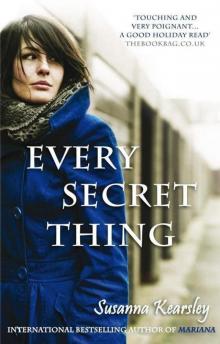 Every Secret Thing
Every Secret Thing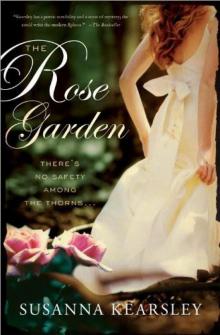 The Rose Garden
The Rose Garden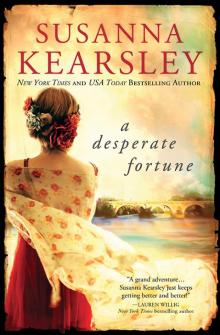 A Desperate Fortune
A Desperate Fortune The Winter Sea
The Winter Sea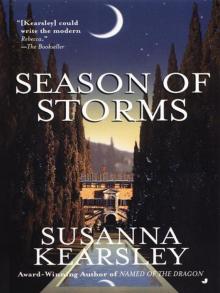 Season of Storms
Season of Storms Mariana
Mariana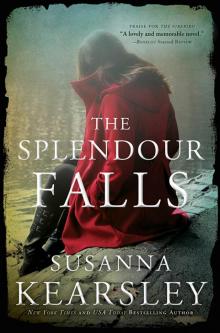 The Splendour Falls
The Splendour Falls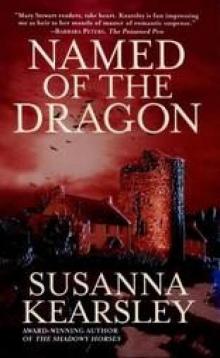 Named of the Dragon
Named of the Dragon Sophia's Secret
Sophia's Secret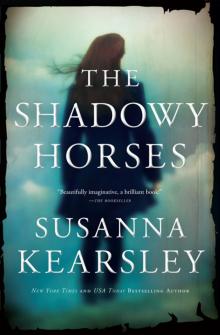 The Shadowy Horses
The Shadowy Horses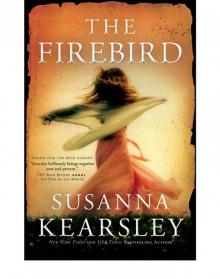 The Firebird
The Firebird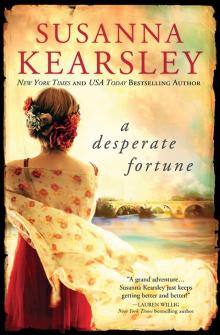 Desperate Fortune
Desperate Fortune